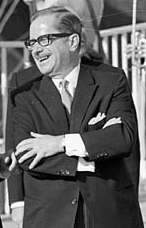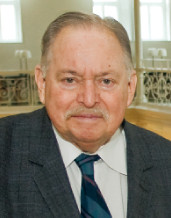The Quebec general election of 1966 was held on June 5, 1966, to elect members of the Legislative Assembly of Quebec, Canada. The Union Nationale (UN), led by Daniel Johnson, Sr, defeated the incumbent Quebec Liberal Party, led by Jean Lesage.

The National Assembly of Quebec is the legislative body of the province of Quebec in Canada. Legislators are called MNAs. The Queen in Right of Quebec, represented by the Lieutenant Governor of Quebec and the National Assembly compose the Legislature of Quebec, which operates in a fashion similar to those of other Westminster-style parliamentary systems.
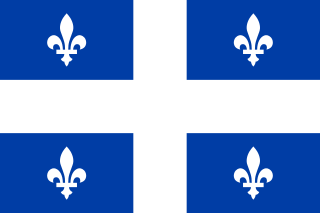
Quebec is one of the thirteen provinces and territories of Canada. It is bordered to the west by the province of Ontario and the bodies of water James Bay and Hudson Bay; to the north by Hudson Strait and Ungava Bay; to the east by the Gulf of Saint Lawrence and the province of Newfoundland and Labrador; and to the south by the province of New Brunswick and the U.S. states of Maine, New Hampshire, Vermont, and New York. It also shares maritime borders with Nunavut, Prince Edward Island, and Nova Scotia. Quebec is Canada's largest province by area and its second-largest administrative division; only the territory of Nunavut is larger. It is historically and politically considered to be part of Central Canada.

The Union Nationale was a conservative and nationalist provincial political party in Quebec, Canada, that identified with Québécois autonomism. It was created during the Great Depression and held power in Quebec from 1936 to 1939, and from 1944 to 1960 and from 1966 to 1970. The party was founded by Maurice Duplessis, who led it until his death in 1959.
Contents
In terms of the number of seats won, the election was one of the closest in recent history, with the UN winning 56 seats to the Liberals' 50. Generally, Quebec's first past the post electoral system tends to produce strong disparities in the number of seats won even if the popular vote is fairly close. The Liberals won 6.5% more votes, but were denied a third term because rural areas were slightly overrepresented in the legislature.
The victory of the UN over the popular Lesage government was a surprise to many observers. Johnson's campaign was likely helped by his position that Quebec should get a better deal within the Canadian confederation, or should separate if it is unable to do so. In this sense, the forces of Quebec nationalism unleashed by the Quiet Revolution begun by Lesage may have contributed to his defeat, as many rural voters felt chagrin at the rapid pace of reform under the Liberals.

Quebec nationalism or Québécois nationalism asserts that the Québécois people are a nation, distinct from the rest of Canada, and promotes the unity of the Québécois people in the province of Quebec.
The Quiet Revolution was a period of intense socio-political and socio-cultural change in the Canadian province of Québec, characterized by the effective secularization of government, the creation of a state-run welfare state (état-providence), and realignment of politics into federalist and sovereigntist factions and the eventual election of a pro-sovereignty provincial government in the 1976 election. The Quiet Revolution typically refers to the efforts made by the Liberal government of Jean Lesage, and sometimes Robert Bourassa, though given the profound effect of the changes, most provincial governments since the early 1960s have maintained an orientation based on core concepts developed and implemented in that era.
The pro-independence Rassemblement pour l'indépendance nationale and Ralliement national obtained a combined total of just under 9% of the popular vote (but no seats).
Ralliement national (RN) was a separatist and right-wing populist provincial political party that advocated the political independence of Quebec from Canada in the 1960s.
This was the last election for the "Legislative Assembly of Quebec". Legislation was passed to replace the bicameral system of Legislative Assembly and Legislative Council of Quebec with a single National Assembly of Quebec, effective December 31, 1968.
A bicameral legislature divides the legislators into two separate assemblies, chambers, or houses. Bicameralism is distinguished from unicameralism, in which all members deliberate and vote as a single group, and from some legislatures that have three or more separate assemblies, chambers, or houses. As of 2015, fewer than half the world's national legislatures are bicameral.

The Legislative Council of Quebec was the unelected upper house of the bicameral legislature in the Canadian province of Quebec from 1867 to 1968. The Legislative Assembly was the elected lower house.
Daniel Johnson died in office in 1968, and was succeeded by Jean-Jacques Bertrand. Johnson's sons, Pierre-Marc and Daniel Jr each later served as Premier of Quebec.
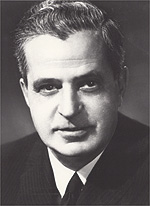
Jean-Jacques Bertrand was the 21st Premier of Quebec, Canada, from October 2, 1968, to May 12, 1970. He led the Union Nationale party.
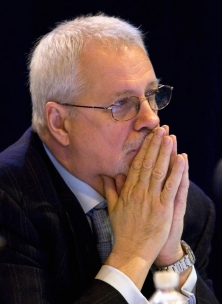
Pierre-Marc Johnson,, is a Quebec lawyer, physician and politician. He was the 24th Premier of Quebec from October 3 to December 12, 1985, making him the province's shortest-serving premier.

The Premier of Quebec (French: Premier ministre du Québec or Première ministre du Québec is the head of government of the Canadian province of Quebec. The current Premier of Quebec is François Legault of the Coalition Avenir Québec, sworn in on October 18, 2018 following the 2018 election.



